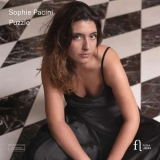Mit einer hoch dramatischen Ersten Ballade beginnt Sophie Pacini ihr Chopin-Programm. Sie spielt mit einer Natürlichkeit und einer Kohärenz wie sie Balladen-Spezialist Horowitz (bei aller herausragenden Qualität des Spiels) eigentlich nie erreichte, weder 1947 noch 1982 und schon gar nicht in seiner eher manierierten Aufnahme von 1968. Pacinis Interpretation ist aus einem Guss, sie fließt von Anfang bis Ende und verpasst doch nichts, was essentiell ist, erreicht alle Ausdrucksmomente und alle Kontraste. So und nur so, mit dieser ursprünglichen und persönlichen Emotionalität erreicht diese Ballade eine maximal zwingende Kraft und wird zu dieser leidenschaftlichen Erzählung, deren Inhalt Chopin nur musikalisch gefasst hat, und die einen tiefen Blick in seine Seele erlauben.
Auch in den übrigen Stücken weicht Sophie Pacini nie von der Ehrlichkeit gegenüber sich selber ab und prägt Chopins Musik mit ihrer Persönlichkeit. Ihre Etüden werden ungemein ausdrucksvoll, spannend und manchmal direkt explosiv. Das ist große Klavierkunst und eine pianistisch maximale Auswertung des vorhandenen Materials. Ihre Walzer sind nicht weniger emotional, verspielt lustig bis melancholisch (Nr. 1), wunderbar nostalgisch (Nr. 2), schmerzvoll (Nr. 10), resigniert (Nr. 11) oder schwärmerisch (Nr. 14).
Zur Erholung von so viel Drama streut die Pianistin einige wunderbar nachdenkliche Präludien von Scriabin und das 20. Nocturne von Chopin ein. Und so ist diese ganze Puzzle-CD eine spannende Klavierreise, bei der Sophie Pacini, völlig auf die Musik und nicht auf das ganze Chopin-Brimborium konzentriert, immer wieder überrascht, aber nie Fragen aufwirft, weil ihre antizipierten Antworten so restlos überzeugend sind.
Sophie Pacini begins her Chopin program with a highly dramatic First Ballade. She plays with a naturalness and a coherence that ballad specialist Horowitz (for all the outstanding quality of his playing) never actually achieved, neither in 1947 nor in 1982 and certainly not in his rather mannered recording of 1968. Pacini’s interpretation is of one piece, it flows from beginning to end and yet misses nothing that is essential, reaches all moments of expression and all contrasts. In this way and only in this way, with this original and personal emotionality, this Ballade achieves a maximally compelling power and becomes that passionate narrative whose content Chopin only captured musically, allowing a deep glimpse into his soul.
Sophie Pacini never deviates from honesty with herself in the other pieces either, imprinting Chopin’s music with her personality. Her Etudes become immensely expressive, exciting and sometimes directly explosive. This is great piano art and a pianistically maximum exploitation of the available material. Her waltzes are no less emotional, playfully funny to melancholy (No. 1), wonderfully nostalgic (No. 2), painful (No. 10), resigned (No. 11) or rapturous (No. 14).
For respite from so much drama, the pianist intersperses some wonderfully reflective preludes by Scriabin and the 20th Nocturne by Chopin. And so this whole puzzle CD is an exciting piano journey in which Sophie Pacini, totally focused on the music rather than all the Chopin bric-a-brac, never fails to surprise but also never raises questions because her anticipated answers are so utterly convincing.






















